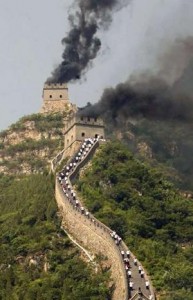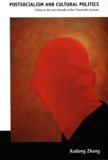Populism wins the day in Japan
The overwhelming victory of the Democratic Party of Japan over the LDP, who have ruled Japan almost continuously since the 1950s, signals not only a populist shift in Japanese politics but also a possible realignment of Japanese foreign policy. What will this means for Japan-China relations is still unclear. In an interesting position statement entitled “Japan must shake off US-style globalization,” Yukio Hatoyama, the head of the Democratic Party of Japan, poses his party as critical of American globalist capitalism, constructing “national traditions” as the firm ground on which non-capitalist values can moderate market utopianism. As Hatoyama states:
The economic order or local economic activities in any country are built up over long years and reflect the influence of each country’s traditions, habits, and national lifestyles. However, globalism progressed without any regard for various non-economic values, nor for environmental issues or problems of resource restriction. If we look back on the changes in Japanese society that have occurred since the end of the cold war, I believe it is no exaggeration to say that the global economy has damaged traditional economic activities and destroyed local communities…. Our responsibility as politicians is to refocus our attention on those non-economic values that have been thrown aside by the march of globalism.
While the Democratic Party is careful not to sound too anti-American and always offers the caveat that the US-Japan relationship will remain strong under their administration, they clearly express a recognition of the need to moderate Japan’s policy towards China. Hatoyama talks of “overcoming nationalism through an East Asian community”-one wonders it this will remind other East Asian people of the WWII-era Greater East Asian Co-Prosperity Sphere-stating that:
…we must not forget our identity as a nation located in Asia. I believe that the East Asian region, which is showing increasing vitality in its economic growth and even closer mutual ties, must be recognized as Japan’s basic sphere of being. Therefore, we must continue to make efforts to build frameworks for stable economic cooperation and national security across the region.
In a statement that must be making the US nervous, Hatoyama even questions the hegemony of the US dollar, saying:
The recent financial crisis has suggested to many people that the era of American unilateralism may come to an end. It has also made people harbor doubts about the permanence of the dollar as the key global currency. I also feel that as a result of the failure of the Iraq war and the financial crisis, the era of US-led globalism is coming to an end and that we are moving away from a unipolar world toward an era of multipolarity.
How they navigate these straights in a time in which the global financial order is in flux will be interesting to watch.





Thanks for posting on this most momentous of topics.
A couple of observations/provocations:
1) The DPJ does seem to be pro-East Asian multilateralism, but in some respects its domestic economic policy is more neo-liberal (and in others less neo-liberal) than that of the LDP’s old guard (not the renegade Koizumi faction). It is kind of like the “Third Wayist” Democratic Party of South Korea in this regard. If the Japanese populace comes to associate more robust political cooperation with China with a continued economic squeeze, they will once again be ripe for the demagogic populism of now-discredited Abe and Aso types.
2) In the medium-run, Japanese authorities may be looking toward a truly multipolar international currency reserve scheme, but at the moment Japanese big business (who, make no mistake, are part of the DPJ firmament) is squawking about how dollar devaluation is cutting into their export competitiveness. To the Japanese TNC’s, a RMB-yen bloc centered in East Asia only makes sense if Chinese effective demand is deepened, and that goes back to our earlier discussion of the possibilities of/obstacles to a new growth model in the PRC.
I should start posting some of this on my own, instead of piggybacking on your efforts. Soon I will, at least I hope I will…
Leave your response!